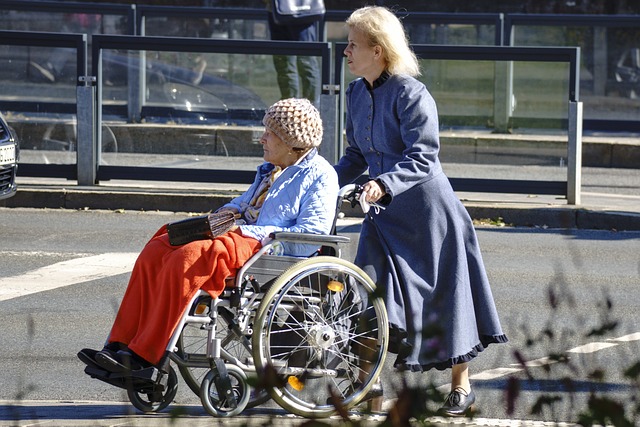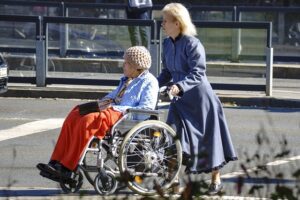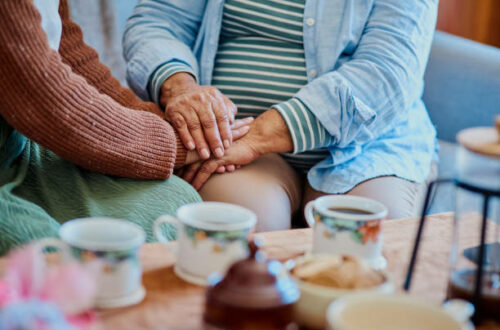
Listening to the Family Caregiver: Stories from the Frontlines
“There are only four kinds of people in the world: Those who have been caregivers. Those who are currently caregivers. Those who will be caregivers, and those who will need a caregiver.”—Rosalyn Carter
There are numerous family caregiver stories—one for every family caregiver.
And exactly how many family caregivers are there?
Key Facts:
- In 2020, 41.8 million Americans provided unpaid care to an adult over the age of 50. That’s nearly 17% of the U.S. adult population.
- 89% of caregivers care for a relative or other loved one, such as a spouse.
- 7 hours per week is the average time caregivers spend providing unpaid care for loved ones they don’t live with; those who live with their care recipient spend 37.4 hours a week.
- More than 75% of all caregivers are female.
- The average caregiver is 50.1 years old.
- Caregivers provide an estimated $470 billion in free labor each year.
(Source: www.aplaceformom.com)
And every one of these 40+ million family caregivers has a story.
In this article, I will share family caregiver stories in three categories: (1) Agony, (2) Joy, and (3) Love.
First, I would like you to meet three (3) women who share stories of distress.
Stories of Agony
Emily writes:
“I’m beyond furious right now! Both Mom and Grammy are irresponsible with money. Without my knowledge, they let the power bill slip for a couple of months. Mom made a small payment in December, barely enough to leave a dent in the bill.
“Mom had an appointment today three hours away, and Grammy was nice enough to take her so I could sleep in. I woke up and discovered the power had turned off! The house’s temperature was already down to fifty-seven and continued to drop. We had an electric stove, but I couldn’t cook.
“All but three dollars of my check went to rent this month because Mom couldn’t give her portion of it in time. There’s no income for at least two more days.
“I’m hungry, I want to shower, but I’d rather not have icicles hanging from my nips!
“F*** this!”
Yes, Emily described herself as angry.
And anger can kill.
Perhaps you’ve heard expressions such as, “I was so mad I could have died.”
Anger, known for years as one of the most lethal of all emotions, is often linked to heart attacks and strokes.
The health risks of anger are many.
(Source: A Family Caregiver’s Guide: 7 Secrets to Replace Negative Triggers with Positive Emotions 2019)
This brief story illustrates one of the issues family caregivers must face when caring for ill loved ones: understanding how to navigate the challenges of negative emotions.
Sophia writes:
“How do I get the person I am caring for to treat me with kindness and respect—and maybe even appreciation? It is so hard for me to continue giving her all this care, and especially to be patient and kind with her.
“She blames and criticizes me for so many things all day. Please note that she is my twenty-year-old daughter. She is sick and extremely depressed, but so am I!
“I’m always giving of myself. It feels so depressing and empty. This is intolerable. I’m only human and I can only take so much.”
Barbara writes:
“Rant alert! As if caring for your loved ones through terminal illness or behavior issues isn’t bad enough—or even navigating systems that promise to offer help but are broken, at best. But what really gets me is when your own f*****g siblings can’t find any f*****g compassion or consideration or even give you a f*****g chance to get back on your feet after you’ve been knocked down time and time again for many years—whether it be emotionally, physically, financially, or mentally.
“My mum moved into residential care two weeks ago, and she loves it. Why? Because she has company and is well cared for. I fully supported her decision. But my brothers? Oh no! One stopped talking to me. The other doesn’t understand why I haven’t found a job yet and moved out of the family home, and he wants me to pay for my mum’s residential care.
“Times like these are when I’m convinced I’m adopted. I’m so f*****g angry! I have had to put my dreams on hold constantly, and I now finally get a chance to build my business with some great products and services but with n f*****g support from my family at all!”
(Source for these three stories: A Family Caregiver’s Guide: 7 Secrets to Replace Negative Triggers with Positive Emotions 2019)
But the family caregiver stories from the frontlines are not all gloom-ridden.
Stories of Joy
Actor Don Cheadle, caregiver for his mom who had Alzheimer’s, shared:
“My mom was very funny. She had a huge sense of humor and was very quick-witted. She would always say, ‘I can spell memory, but I don’t have one.’ We always thought it was just something she was saying, but over time we started noticing that she was actually forgetting things. She was repeating a lot of things and seemingly getting lost over very routine things.
“She always wanted to take pictures of everybody. At first, we thought she just wanted to take a lot of pictures, but as we played it back, we realized she was trying to remember and hold to the images—hold on to people—and stop the slide.
“I don’t know what the average rate of decline is for someone with the disease. I’m sure it’s different for everybody, but for us, it happened over two or three years.
“One of the things that we learned from this whole experience is that when the signs start to show, you realize that you’re on this journey, you really have to put your arms around each other—people who are the caregivers, the family members, the friends.
“You have to keep pulling each other up while at the same time caring for the person with the disease.
“The hardest part was the not knowing—the uncertainty—and the feeling of helplessness. We are a very close-knit family, and we’re used to being able to fix things. Everyone’s very capable, but dementia doesn’t care that you’re capable. It’s gonna do what it’s gonna do, and you are powerless to prevent what’s happening.
“Ultimately, the grace and the takeaway that made it bearable was the love revealed in our family. It concretized something that we knew was already there.
“When we showed up in that way, and when we came together in that way, it was because of Mom. She was still the centering part of our relationship and brought all of us together, even though it came at an incredibly hard cost.
“If caregivers can extract that from this experience and look to those grace notes, then hopefully they can keep showing up because it’s really, really, really important work.”
(Source: www.ALZ.org/blog)
Comedian Wayne Brady shares his caregiver story and the power of laughter.
Wayne Brady’s ability to find humor in almost any situation has won the hearts of audiences around the world, and this talent has also served him well as an Alzheimer’s caregiver for his grandmother, Valerie Peterson, who raised him from the time he was a baby.
Speaking of his grandmother’s memory loss, Brady writes:
“Every once in a blue moon, especially towards the end when she wasn’t talking much, she would just snap to. You’d be feeding her, and out of nowhere, she went from sitting there with her eyes closed and not speaking, to saying, ‘I said I didn’t want that soup. You eat it. I don’t want it.’ And we would laugh so hard because we could see that she was still in there somewhere.”
Brady’s longtime support of the Alzheimer’s Association deepened his commitment to the cause after Valarie’s death in March 2022.
When Brady competed on the TV show “Celebrity Game Face” hosted by comedian Kevin Hart, Wayne Brady selected the Alzheimer’s Association as his charity of choice.
Wayne Brady also dedicated his recent performance on “Dancing With the Stars” to Valerie on the TV show.
Brady says, “I think of the disease as someone turning down the lights in a room until, at some point, you’re in utter blackness. So, when those moments of light would pop through, that would just be amazing.”
(Source: Alzheimer’s Association Magazine)
Stories of Love
Meet Shelly:
“Mom is becoming increasingly incontinent. She hates being cleaned up and changed. She insists on keeping her soaked Depends diaper. She fights me tooth and nail when I am trying to help her. She screams, cries, and gets us both worked up beyond all reason.
“I know this is due to the disease, but in the heat of the moment, I often find myself just reacting out of my frustration.
“Today, we started the same insane dance. Mom was crying for help, and I was trying to help her. She stayed in this loop, fighting me each step of the way.
“I found myself taking deep breaths, deciding to stop the struggle. I took her face in my hands and lifted it until she could see me and look into my eyes. I held eye contact for a heartbeat and said calmly, ‘Mom, I am trying to help you. Do you want me to help you?’
“Suddenly, all the anger and fear melted from her face. She simply said, ‘I love you.’ And just like that, the tantrum was over, and I managed to get her cleaned up and out of the bathroom.
“I hope I can do this again next time—and time after that and so forth. We are growing so tired of struggling with each other as we battle this horrific disease.
“Remember to breathe today. Remember the love you have—even when it seems so far away.”
Meet Doug:
“I do not complain. I am a caregiver to both my wife, Ann, age seventy-three, and my dad, Walter, age ninety-four, and I consider it an honor and privilege to serve them both. My wife had had a collapsed lung and suffered a heart attack, and I almost lost her.
“When the hospital released Ann to come home, I can recall seeing her sitting back on the bed with an air of resignation about her and with such sadness in her eyes. She said, ‘I can feel the spirit leaving my body.’ I just stared at her. My heart was too heavy for me to respond.
“My dad had had a stroke. One side of his body was almost paralyzed. His hearing had faded, but he was a fighter and still hanging on. But I looked at him when he would be wincing in pain, and I could feel the gaping hole in my chest where my heart used to be. My dad was so skinny I could see his ribs pressed into his thin pajama shirt.
“Of course, they both need help wiping. However, I feel fortunate that both are in hospice at home, where I have access to services whenever I need them and can call the 24/7 Hotline in an emergency. But Dad especially is declining quickly.
“It hurts me to see Ann and my dad this way. How can I feel happy and upbeat when they are in such a situation or pain?
“But I love my dad and treasure and love my wife deeply.
“And I’m so tired.”
(Source: A Family Caregiver’s Guide: 7 Secrets to Replace Negative Triggers with Positive Emotions 2019)
***** *****
Listening to the Family Caregiver
You will discover stories of sadness and distress, of course, but also stories of hope and love.
Are you a family caregiver?
Caring for a loved one can be devasting and a real challenge.
But I hope the stories I have shared in this article will leave you feeling positive about your role.
Best wishes to you!!
Source for this article: A Family Caregiver’s Guide: 7 Secrets to Replace Negative Triggers with Positive Emotions (2019)
Resources for Caregivers
Across HHS, our agencies provide resources for caregivers who take care of an aging, seriously ill, or disabled family member or friend. Learn more about being a caregiver and locate resources:
- Caregivers (MedlinePlus®)
Information for caregivers provided by the National Library of Medicine at NIH. - Mental Health and Addiction Insurance Help
This consumer portal prototype is being released to help consumers get to the correct resource to solve their Mental Health and Substance Use Disorder insurance coverage issue. - Proveedor de atención al paciente (MedlinePlus®)
Spanish-language information for caregivers provided by the National Library of Medicine at NIH. - Caregiving (Medicare.gov)
Resources, stories, and newsletters about taking care of someone with Medicare. - Caregiving (National Institutes on Aging)
Information on caregiving from the National Institutes on Aging at NIH. - Caregivers (Administration for Community Living)
Help and resources for caregivers from the Administration for Community Living. - Alzheimers.gov
The government’s information resource for people taking care of those with Alzheimer’s disease and related dementias. - Eldercare Locator (Administration on Aging)
A public service connecting you to services for older adults and their families




